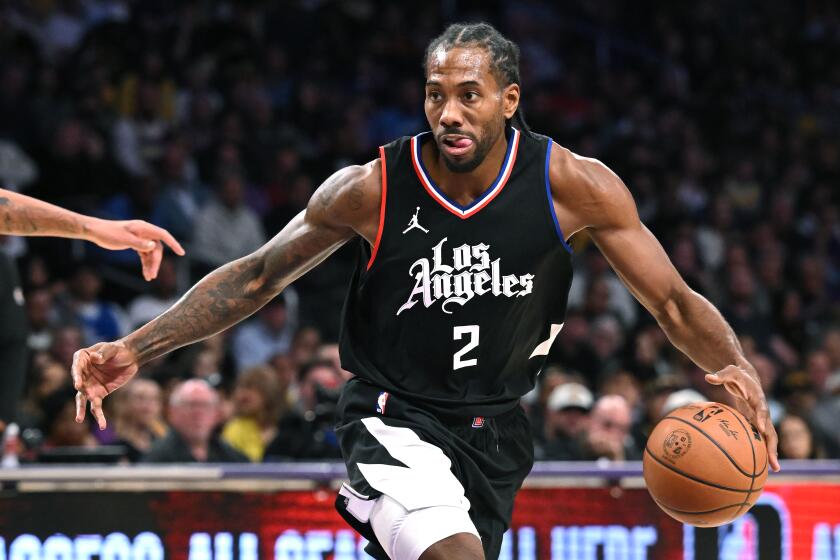MLS-best Galaxy succeed in relative obscurity despite Beckham
At his introductory news conference 4 1/2 years ago, David Beckham spoke of wanting to raise soccer’s profile in the United States.
“I know there’s the baseball, the basketball, the American football, but I believe that the excitement that can be caused by those other sports can be caused also by soccer,” he said at the time.
That has yet to happen.
With Beckham’s contract on the verge of expiring and his days in Major League Soccer perhaps coming to an end, most of Los Angeles is probably unaware that the Galaxy is visiting the New York Red Bulls on Sunday for its playoff opener.
Beckham has had the best season of his injury-riddled tenure with the Galaxy and is considered a most-valuable-player candidate, but his performance hasn’t made many headlines outside of soccer-centric media outlets.
Beckham, who ranks second in the league with 15 assists, said he isn’t disappointed by his failure to push his sport into the American mainstream.
“We’re talking about only five years,” Beckham said. “These [other] sports have been in this country for many, many years. The Premier League in England has been around for many years. So it takes time. I always said that when I moved here. Don’t expect it to happen in the next three, four, five, 10 years. It takes time to build the legacy of a sport, and rightly so.”
He described himself as satisfied with the modest gains MLS has made in the last five years, among them its continued expansion and building of soccer-specific stadiums.
Coach Bruce Arena pointed out that the Galaxy brand has become recognizable in other parts of the world, where interest in Beckham remains relatively high. Landon Donovan said Beckham has helped the league sign other high-profile international players, including the Red Bulls’ Thierry Henry and Rafael Marquez.
But for all of the advances MLS has made, it still hasn’t implemented a sensible playoff format. In 2011, 10 MLS teams qualified for the playoffs. Two wild cards played the two lowest-seeded teams to whittle the field to eight. Those eight teams face off in two-game, total-goals series; followed by single-elimination contests for the final four and the championship match.
The Galaxy finished the regular season with the best record in MLS. In most of the world, that would be enough to make it the champion. The Red Bulls, which had the 10th-best record in the 18-team league, would be closer to being demoted to the second division than it would be to a title.
“It should be the same as anywhere else,” Beckham said.
MLS is convinced that American sports fans demand a postseason, and it might be right. But by inviting 10 teams to the playoffs, the Galaxy’s dominance over the last 7 1/2 months has been rendered almost meaningless.
This is particularly true because of soccer’s low-scoring nature. Superior play is frequently unrewarded — the Galaxy was clearly the league’s top team but won only 19 of its 34 games.
Home-field “advantage” for the Galaxy will consist of it hosting the Red Bulls on Thursday in the second game of the total-goals series. About the only real advantage the Galaxy has is that the Red Bulls had to face FC Dallas in a play-in game Wednesday. Then again, the Galaxy had to take a cross-country flight Friday.
“If you play 34 games and finish with 67 points, I think there should be a little more advantage than playing a home and away with a team to get to the next round,” Donovan said. “There’s no debate. Everyone knows it’s not right.”
Donovan can point to history to support his case.
The system has resulted in the coronation of appallingly unworthy teams. Each of the last two champions finished fifth in their conference, including 2009 winner Real Salt Lake, which had a sub-.500 record. The Galaxy won the MLS Cup in 2005 after finishing the regular season 13-13-6.
twitter.com/dylanohernandez
More to Read
Get our high school sports newsletter
Prep Rally is devoted to the SoCal high school sports experience, bringing you scores, stories and a behind-the-scenes look at what makes prep sports so popular.
You may occasionally receive promotional content from the Los Angeles Times.






